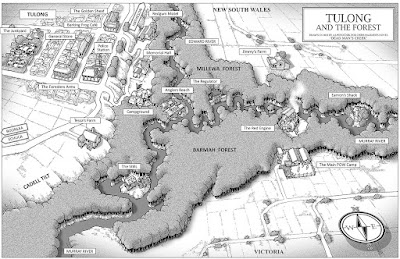Anna Funder is a brilliant writer and I eagerly await any new publication. Her exploration of the East German secret police in Stasiland - Stories from Behind the Berlin Wall (2003) is a meticulously researched work of non-fiction. Her compelling debut novel All that I Am (2011) won the Miles Franklin Award in 2012. Her novella The Girl with the Dog (2015) is a gem of a story. So when I heard she was working on a book about George Orwell's wife, I preordered it months from publication and devoured it the moment it arrived.
Wifedom - Mrs Orwell's Invisible Life (2023) explores the life of Eileen O'Shaughnessy Blair (1905-1945), the woman behind George Orwell's success. Eileen is entirely absent from Orwell's work, despite her active role in supporting his career, and is sidelined in most biographies about the author. Funder had to find scraps of information - six letters written by Eileen to her friend Norah, recollections of friends of the Orwells, and other materials to piece together the life of this remarkable woman. In doing so, Funder has brought Eileen to the forefront and given her the credit she deserves for her role in the life and work of her husband.
Born in northeastern England, Eileen O'Shaughnessy was an intelligent woman, graduating from Oxford with a degree in English. She later studied at University College London for a Masters in educational psychology. At a party in 1935, Eileen met Eric Blair. Blair has recently published his early novels
Burmese Days (1934), and
A Clergyman's Daughter (1935), under is pen name George Orwell. The couple married the following year and moved to a cottage in Hertfordshire where she would perform all the domestic duties, tending to his various illnesses, caring for their animals and garden, and typing up his manuscripts while he would write.
In 1936 Orwell went to Spain to join the civil war in the fight against fascism. While away, Eileen sorted out the publication of Orwell's The Road to Wigan Pier (1937) and then bravely packed up and moved to Barcelona herself. There she took up a post at the Independent Labour Party (ILP) office as a typist, logistician, and key supporter of the war effort. It was extremely dangerous for Eileen as spies were everywhere and many of her collegues were arrested or forced into hiding. When they needed to escape the country, Eileen managed to secure passports and passage out of Spain and in July 1937 they arrived back at their cottage. While in Spain, Orwell wrote Homage to Catalonia (1938) on scraps of paper smuggled back to Eileen in Barcelona. She typed up the manuscript and kept it hidden from the various raids on her office and lodgings. Despite her instrumental role in supporting his war effort, Eileen only appears in Homage to Catalonia as a passing reference to 'my wife'.
After a six month stint in Morocco, where Orwell wrote Coming Up For Air (1939), they returned to the UK and Eileen moved to London to takes up a role at the Ministry of Information, and later the Ministry of Food. Her income allows Orwell the freedom to write as he was doing bits and pieces for the BBC. He eventually joined her in a rented a flat in London where he wrote Animal Farm (1945) with Eileen's support.
 |
| Eileen and Richard 1944 |
Eileen always wanted to have a family, and only learned late in her marriage that her husband was sterile (he knew but failed to tell her). In 1944 they adopted a baby they named Richard. As London was being bombed, she and her sister-in-law moved to County Durham with their children to protect them from war. Here Eileen's health deteriorated and she was in need of a hysterectomy. At age 39, she died during this surgery. At the time of her death, Orwell was in Paris as a war correspondent. He returned home and moved to a house on Jura where he would write
Nineteen Eighty-Four (1949), a novel greatly influenced by his late wife.
Eileen's short life was hard and sad. Funder shows how Eileen was intelligent, engaging and quick-witted, but she suppressed her own ambition to support her husband's career. Orwell himself comes off as an unlikable monster. Self-absorbed, promiscuous, demanding, absent - he really didn't appreciate Eileen until it was too late. I really felt for her and wondered why she put up with him. I don't think I would have had her strength of character and commitment to such an unequal relationship.
Wifedom is a book which defies categorisation. Funder infuses her non-fiction exploration of Eileen's life, with snippets of her own experiences as wife and mother. She also crafts fictional scenes which meld with Eileen's letters to Norah, bringing the story to life. At times this didn't work for me and I found the transitions between styles a bit jarring. But as I read on, the power of Funder's prose and the way in which she resurrected Eileen's life became captivating and impressive. Funder took risks in writing this book and they paid off.
I recently re-read Orwell's magnificent Nineteen Eighty-Four and having read Wifedom the book has new meaning for me. I am looking forward to reading/re-reading some of Orwell's other work to explore Eileen's influence.




